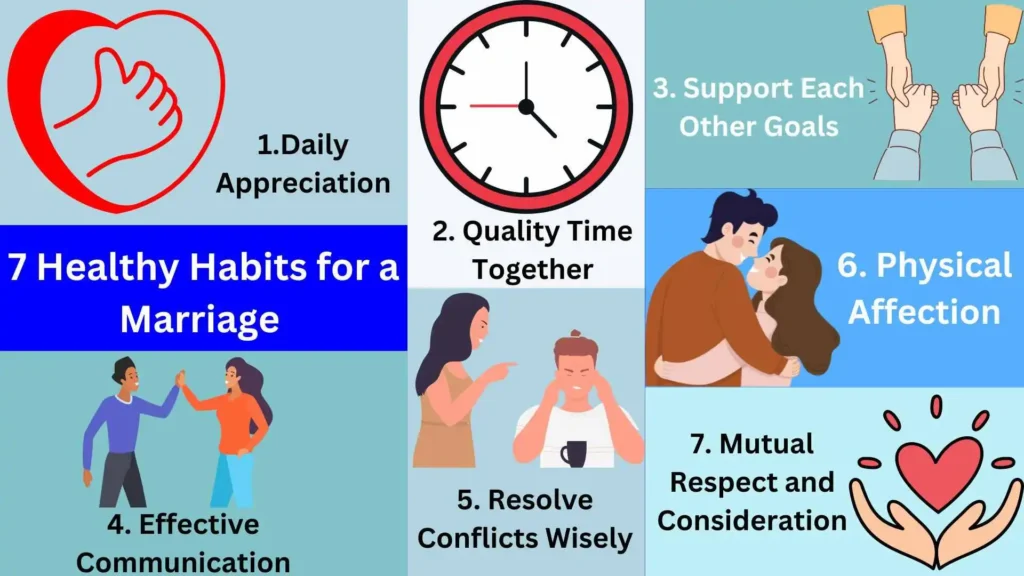Marriage, often described as a partnership for life, is a journey that comes with its own set of challenges and rewards.
It’s a bond that brings together two individuals, promising love, support, and companionship. But what makes a marriage truly healthy? Maintaining a healthy marriage takes more than love; it requires effort, understanding, and a few key habits.
How can you have a good marriage? The top 7 habits for a healthy marriage will help you to transform your marriage.
Table of Contents
What is a Healthy Marriage?
A healthy marriage is a partnership grounded in mutual respect, open communication, and emotional support, where both individuals feel valued and understood.
A healthy marriage allows couples to openly express their thoughts and feelings, ensuring that both individuals are respected and appreciated. The foundation is built on trust and honesty, which provides emotional security.
Top 7 Healthy Habits for a Marriage
Like other healthy relationship habits, you can master your healthy marriage through the following habits.

1. Daily Appreciation
Daily appreciation involves recognizing and expressing gratitude for your partner’s efforts, qualities, and presence in your life. It’s about valuing the little things and acknowledging the big things, creating a positive and supportive environment.
Does Daily Appreciation Matter in Marriage?
Yes, it matters a lot. Appreciation acts as the glue that holds a relationship together. It reinforces love, respect, and trust, making both partners feel valued and understood. Without appreciation, even the strongest relationships can feel strained and unfulfilled.
As William Arthur Ward famously said, “Feeling gratitude and not expressing it is like wrapping a present and not giving it.”
Research has shown that expressing gratitude can boost mental well-being. According to Psychiatrist, Kristin Francis, gratitude triggers the release of dopamine and serotonin, which are neurotransmitters responsible for feelings of happiness and contentment.
Showing daily appreciation is a healthy habit for a marriage. You can show it with the help of the following ways.
I. Verbal Affirmations
Simple verbal affirmations like “Thank you,” “I appreciate you,” and “You’re amazing” can go a long way in making your partner feel valued.
II. Acts of Kindness
Small acts of kindness, such as making your partner’s favorite meal or helping with chores, demonstrate appreciation. These gestures show that you care about their happiness.
III. Thoughtful Gestures
Thoughtful gestures, like leaving a loving note or planning a surprise date, can make your partner feel cherished. These acts show that you are thinking of them and value your relationship.
2. Quality Time Together
Quality time is dedicated, uninterrupted time spent together, focusing on each other without distractions. It’s about engaging in activities that both partners enjoy and that foster deeper connections and understanding.
According to Gary Chapman, author of “The Five Love Languages,” “quality time is one of the fundamental ways to express love and build intimacy.”
Why it Matters in Marriage?
- Spending quality time together is crucial for maintaining a strong emotional connection between partners in a healthy marriage. It is also good for the healthy habits of their kids.
- It provides an opportunity to express feelings, share thoughts, and truly understand each other’s perspectives.
- Regularly spending quality time together builds trust and intimacy.
- When couples spend uninterrupted time together, they can communicate more openly and honestly. This improved communication helps in resolving conflicts and understanding each other’s needs and desires.
As John Gottman, a renowned relationship expert, stated, “Successful long-term relationships are created through small words, small gestures, and small acts.”
With the help of the following ways, you can build the habits of spending quality time in a healthy marriage.
I. Shared Hobbies and Interests
Engaging in shared hobbies and interests is a great way to spend quality time together in healthy marriage. Whether it’s cooking, gardening, or playing a sport, these activities help couples bond over common passions.
II. Regular Date Nights
Scheduling regular date nights can help keep the romance alive. Whether it’s a fancy dinner or a simple walk in the park, what matters is the time spent focusing on each other.
III. Traveling Together
Traveling provides an excellent opportunity for couples to experience new things together. Exploring new places and cultures can strengthen your bond and create lasting memories.
IV. Daily Rituals
Incorporating small daily rituals, like having morning coffee together or sharing a bedtime routine, can make a big difference. These rituals provide consistent opportunities for connection.
3. Support Each Other Goals
Supporting each other’s goals is not just a gesture of encouragement but a crucial element in establishing a strong and enduring marital bond. It fosters a sense of partnership, strengthens trust, and enhances communication.
According to relationship experts, couples who actively support each other’s aspirations tend to experience greater satisfaction and longevity in their marriages.
Benefits of goal support in marriage,
- Enhance emotional connection
- Encourage Mutual growth
- Increase trust and respect
- Improve communication
Moreover, you can support each other through the following ways in a healthy marriage.
I. Active Listening and Encouragement
Take time to actively listen to your spouse’s goals without judgment. Offer genuine encouragement, celebrate milestones, and provide reassurance during setbacks.
II. Set Shared Goals
Identify and work towards shared goals that align with both partners’ aspirations. This promotes collaboration, strengthens unity, and reinforces mutual support.
III. Allocate Time and Resources
Support may involve allocating time, and resources, or making sacrifices to help your spouse achieve their goals. This demonstrates commitment and prioritization of their aspirations.
IV. Offer Practical Assistance
Provide practical assistance whenever possible, such as helping with tasks related to their goals, offering feedback, or connecting them with resources and networks.
4. Effective Communication
Effective communication is the foundation of a strong, lasting, and healthy marriage. It goes beyond mere conversation; it involves active listening, empathy, and mutual understanding.
As peter Drucker said, “The most important thing in communication is hearing what isn’t said.”
Having effective communication in a marriage requires practice and commitment. It allows couples to navigate challenges, resolve conflicts, and celebrate joys together.
You can build the habit of effective communication in healthy marriage through the following tips.
I. Active Listening
Give full attention to your partner without interrupting. Reflect back what you hear to ensure understanding before responding.
II. Be Empathetic
Show empathy by acknowledging your partner’s feelings and validating their experiences, even if you don’t agree with them.
III. Practice Non-Verbal Communication
Pay attention to non-verbal cues of your partner. For example, body language, facial expressions, and tone of voice, as they convey emotions and intentions.
IV. Be Clear and Specific
Communicate clearly and specifically to avoid misunderstandings. Clarify expectations, desires, and concerns openly and honestly.
5. Resolve Conflicts Wisely
In maintaining healthy marriage one of the most significant challenges couples face is resolving conflicts. Conflicts, when managed wisely, can lead to growth and deeper understanding.
Every marriage experiences conflicts, the key to a successful marriage isn’t avoiding conflicts but rather managing them constructively. However, some habits can make resolving conflicts particularly difficult. That’s why never marry a girl who has these weird habits.
Effective conflict resolution can:
- Strengthen communication
- Build trust
- Promote intimacy
- Enhance problem-solving skills
You can wisely resolve any conflict in a healthy marriage through the following ways.
I. Active Listening
Active listening is crucial for understanding your partner’s perspective. It involves fully concentrating, understanding, responding, and remembering what is being said.
II. Stay Calm and Composed
Emotional outbursts can escalate conflicts. Staying calm allows for a more rational and productive discussion.
III. Focus on the Issue, Not the Person
Attack the problem, not your partner. Avoid blaming or using accusatory language, which can make your partner feel attacked and less likely to cooperate.
IV. Compromise and Negotiate
As Ruth Bell Graham says, “A happy marriage is the union of two good forgivers.”
Healthy marriages are built on compromise and negotiation. Both partners should be willing to give and take to reach a mutually satisfying solution.
6. Physical Affection
One of the most significant yet often overlooked habits for healthy marriage is physical affection. But why is physical affection so crucial in a marriage? How does it help sustain a healthy relationship over the years?
Physical affection, such as touching, hugging, or kissing, releases a cascade of hormones and neurotransmitters like oxytocin, often referred to as the “love hormone.” Oxytocin promotes feelings of bonding and trust between partners.
Regular physical touch can lower blood pressure and heart rates, reducing the risk of cardiovascular diseases. It also boosts the immune system by reducing stress hormones like cortisol.
Diane Ackerman said, “Touch seems to be as essential as sunlight.”
Physical affection reduces feelings of anxiety and depression. It acts as a non-verbal communication method, conveying love, appreciation, and reassurance.
You can use the following tips to have the habit of physical affection in a healthy marriage.
- Daily touch: Begin with small gestures like holding hands or a quick hug in the morning.
- Making time for intimacy: Schedule regular date nights or private time to ensure that physical affection remains a priority.
- Communicating needs and desires: Open communication about your needs and desires regarding physical affection is vital. This ensures both partners feel valued and understood.
- Creating a comfortable environment: A cozy, inviting environment can encourage more frequent displays of physical affection.
7. Mutual Respect and Consideration
Mutual respect in a marriage means acknowledging and valuing each other’s individuality, needs, and perspectives. It’s about treating your partner with kindness, fairness, and dignity.
In order to build such respect, you must incorporate self-love habits into your everyday routine. When you practice these habits, you increase your self-awareness and self-esteem, allowing you to be more compassionate and attentive to your spouse.
Similarly, consideration is the practice of being thoughtful and attentive to your partner’s needs and feelings in a healthy marriage. It involves “putting yourself in your partner’s shoes.”
Considerate actions, whether big or small, can significantly enhance your partner’s emotional health. As William Penn says,
“Consideration for others is the basis of a good life.”
You can develop the habit of mutual respect and consideration in a healthy marriage as:
I. Active Listening and Validation
Make it a point to listen to your partner without judgment. Validate their feelings by acknowledging their emotions and showing empathy.
II. Showing Appreciation and Gratitude
Regularly express your gratitude for the little things your partner does. A simple “thank you” or “I appreciate you” can significantly boost their morale.
III. Setting Healthy Boundaries
Discuss and agree on boundaries that respect each other’s comfort zones. This helps prevent feelings of neglect or intrusion.
Conclusion
These seven habits for a healthy marriage can significantly enhance the joy and satisfaction in your marital life. Each habit contributes to creating a supportive, loving environment where both partners feel valued and connected.
Remember, a healthy marriage is a continuous journey of growth and mutual effort. Keep practicing these habits, communicate openly, and always choose each other.
FAQs
Is it okay to seek professional help for our marriage?
Yes, seeking professional help like marriage counseling can be very beneficial. A professional can offer new perspectives and tools to help you navigate challenges and strengthen your relationship.
What is the important factor in a good marriage?
The most important factor in a good marriage is mutual respect. When both partners respect each other, it creates a foundation for trust, communication, and emotional support.




